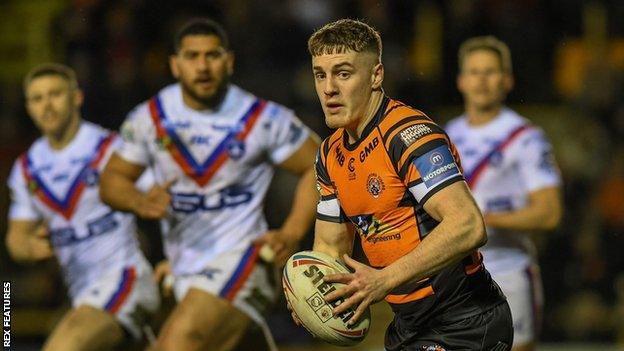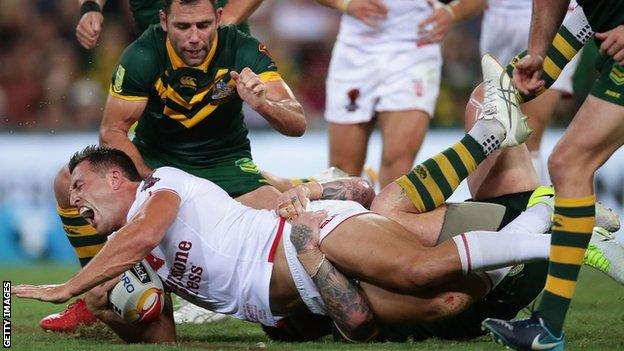Government approves £16m in loans to 'protect sport'
- Published

No Super League fixtures have been played since 15 March
Rugby league in England will receive £16m in government loans to help it recover from the impact of the coronavirus pandemic.
Rugby Football League (RFL) chief executive Ralph Rimmer asked for assistance after the suspension of the game on 16 March.
Culture Secretary Oliver Dowden said the government had intervened "to protect an entire sport".
England is set to host the World Cup in 2021.
Eighteen English venues, predominantly in the north, are scheduled to stage games during the tournament, which runs from 23 October and 27 November, with the men's and women's finals scheduled for Old Trafford.
The sport is seen as a special case because of its social value in mainly northern communities and the risk of it being wiped out.
"Rugby league is not a wealthy sport. But it is rich in the things that matter most - outstanding sporting and life chances in often disadvantaged communities," said Rimmer.
"This support enables the sport to survive, to reshape, to be ready to restart in this our 125th year and to look to a home World Cup."
'Lockdown threatened survival'
Rugby league was created in Huddersfield in August 1895 when northern clubs broke away from the Rugby Football Union over the issue of payments to players, before switching to a 13-man code in 1906.
"The effects of lockdown genuinely threatened the survival of our clubs at all levels and their ability to continue delivering positive social and economic impact," said Rimmer.
"The RFL is grateful to the government for understanding and acting.
"In these very tough times for the country and huge demands, this is confirmation of why rugby league is important and the sport's significant social impact in northern communities in particular."

England hope to go one better in the World Cup next year after losing to Australia in the 2017 final
All England-based Super League and second and third-tier clubs, many of whom have charitable programmes helping people in their areas during the pandemic, will be entitled to apply for money from the government fund.
Culture Secretary Oliver Dowden said: "This is a massive shot in the arm to secure the survival of rugby league.
"We recognise that many RFL clubs operate on very tight financial margins. Without their ability to stage matches with spectators and despite the government's extensive economic package, the professional game has come very close to collapsing.
"Sports across the board are facing unprecedented pressures. In rugby league's case, we are intervening as an exception to protect an entire sport, the community it supports, the World Cup and its legacy for generations to come."
Analysis
Rugby league correspondent Dave Woods
This government intervention will come as a huge relief to every club, from Super League down to League One.
But this is a temporary fix to stabilise the sport. The game is still a long way from being out of the woods.
The £16m will have to be spread wisely because tough times lie ahead. And it is unlikely that recent wage cuts right across rugby league's players and staff will be reversed any time soon.
The RFL - in this current period of co-operation between all the clubs and the central body - have an intimate knowledge of each club's business model and current financial state. So it should be distributed as fairly as possible to hopefully ensure short-term survival for all.
No-one has yet made the decision to cancel any of the big events planned for the next few months - Challenge Cup final, Grand Final and Ashes series.
But common sense would suggest that those big paydays, or even week-to-week league matches at all levels, are unlikely to happen in front of paying customers this side of 2021.
So the financial woes will stretch into next year at the very earliest.
There will be some concern that the money has been given as a loan, which seems a huge mortgage for the game to carry forward into the future. But the terms of this loan are such that that should not be a burden.